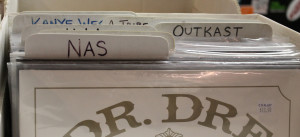This summer, Universal Studio’s film Straight Outta Compton broke box office records as the biggest debut for an R-rated picture in the month of August. The movie had been in development since 2009 and details the rise to fame of the California hip-hop group N.W.A. comprised of Ice Cube, Dr. Dre, Eazy-E, MC Ren and DJ Yella in the late 1980s. Since its release, it has brought to importance the origins of the genre.

Senior Jazmine Atkins saw the film and shared thoughts on the legacy that the rappers leave behind.
“They leave a really strong passion for music, hip-hop and R&B,” Atkins said. “They wanted to keep it going.”
However, some rap and hip-hop listeners are unaware of the roots of their favorite songs and and the influences behind modern-day artists. Rap as a genre of music is fairly new.
Rapper Tupac Shakur, commonly known as Tupac, shared his opinion on what is defined as rap during a 1995 deposition related to accusations of his music inciting violence. He said, “It’s poetry. To me, story-telling poetry…”
English teacher Terrence Foushee had similar thoughts regarding the definition of rap.
“Rap is just something that has come from generations and generations of oral tradition,” Foushee said. “The oral tradition of telling stories and writing poetry has been here for thousands of years.”
Junior Daquan Ghee spoke on the tough subjects Tupac covered in his raps, including racial injustice and the importance of women in society.
“Tupac was thug, but he also rapped about what was happening in the world,” Ghee said. “They took what was happening in the neighborhood and in their life and put it on the songs so it could relate to other people.”
Rap artist J. Cole is popular among students for rapping similarly about world issues and his North Carolina roots. Senior Tyler Collura is a listener of J. Cole.
“His rap is definitely deep, but everyone can understand it,” Collura said. “Tupac was inspiration for a lot of my favorite rappers, like Kendrick [Lamar], J. Cole; J. Cole’s biggest inspirations were Nas and Tupac.”
Senior Chaz Bailey had thoughts on the influence that Tupac and other rappers like Ice Cube, Dr. Dre and Eazy-E have on artists now.
“Their whole sound was gang related, high fashion, bragging almost,” Bailey said. “Travis Scott now, A.S.A.P. Rocky, Kanye West, they’re all kind of into the same idea. So that basically passed on from the early 1990s and so on. I think it’s cool.”
Spanish teacher Cristobal Herrera had similar regards for the original artists of the genre.
“They’re the biggest rap names in history,” Herrera said. “They’re the first that went out of their way to speak their mind no matter what people thought. They’re the big pins, the big rappers of the day that set the path for the new ones.”
Tupac had a rivalry with East-coast artist Notorious B.I.G. or “Biggie” Smalls that ultimately claimed both of their lives.
“Tupac and Biggie, in our eyes as far as rap music, typically are diametrically opposed; either you’re a Biggie fan or Tupac fan,” Foushee said.
Bailey recounted the infamous West Coast-East Coast rivalry of the 1990s.
“Tupac and Biggie were doing their own things, and there was this rivalry that came between them because Tupac was shot five times and then he blamed it on Biggie and his whole record label,” Bailey said. “To add fire, Biggie wrote a song called ‘Who Shot Ya?’ Tupac was still mad about that. People thought of that as Biggie taunting [Tupac], so that just added more tension between the two groups.”
Whereas before insults between feuding parties were done through diss tracks or statements in the media, nowadays they can be aired on the social media website Twitter. Singers such as Nicki Minaj and Taylor Swift have engaged in the practice, and more recently rappers Drake versus Meek Mill. Bailey said his opinion on how the feuds differ.
“‘Who Shot Ya?’ came out and then ‘Hit ‘Em Up’ was Tupac’s response to Biggie,” Bailey said. “It said something along the lines of, “You didn’t do your job right,” “You didn’t finish me off, I’m still here,” and I think that’s a more real beef as opposed to talking junk over Twitter.”
Foushee agreed.
“‘Hit Em Up’ is one of the best diss tracks ever created,” Foushee said. “It came from a real place and it was before social media. They had a relationship before.”
Although Tupac and Biggie’s lives were cut short, their legacy lives on through current rappers and artists who draw inspiration from their work, such as J. Cole and Kendrick Lamar.
“I’m not saying I’m gonna change the world, but I guarantee that I will spark the brain that will change the world,” Tupac said in a 1994 interview with MTV. “And that’s our job. To spark somebody else watching us.”
– By Hunter Koch
